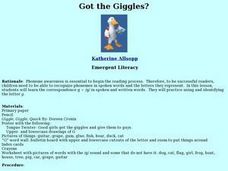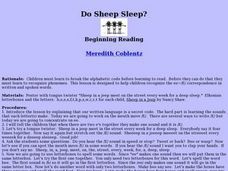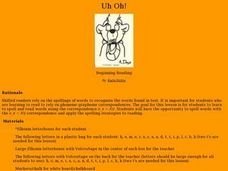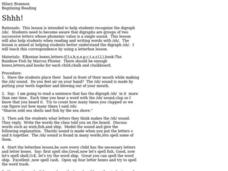Curated OER
IIII---L-lll-ke---IIII-ke-and-M-IIII-ke
Students recognize the letter combination i_e by reading and spelling words with letter boxes in this instructional activity. They say a tongue twister which emphasizes the long /i/ silent /e/ combination. They then listen the story...
Curated OER
Got the Giggles
Students identify the grapheme and phoneme for G. They practice writing the letter G and through listening activities, discriminate the phoneme /g/. They associate the phoneme /g/ with its letter representation and identify it in various...
Curated OER
Ow! That Hurts
Pupils study the ou=/ow/ correspondence in written and spoken words using a tongue twisters and a letterbox instructional activity. They recite the tongue twister and make given words using the letterboxes. Next, they listen to a read...
Curated OER
Ewww, That's Gross
Students recognize the /ew/ digraph in written and spoken words by reading and spelling words with ew=/oo/. They say a tongue twister emphasizing words with the /ew/ digraph. They then listen to the story "Shoe Man" and identify the...
Curated OER
Do Sheep Sleep?
Students gain insight into the correspondence ee = /EE/ in both written and spoken words. They recite tongue twisters with the /EE/ sound and use letterboxes to spell 'ee' words. They read a book with a variety of /EE/ words.
Curated OER
Let's Go to the Farm
Students explore corresponding letters of the alphabet with the corresponding phonemes using farm animals. They create a classroom word wall of the items they saw on a trip to the farm or zoo. Students create pictures to go along with...
Curated OER
Beginning Reader: Mike Flies Kites
Students review the /i/ sound before studying the i_e=/I/ correspondence. They listen for the /I/ sound in word pairs, make words in letterboxes, and recognize the silent e. Next, working in pairs, they read "Kite Day at Pine Lake." As...
Curated OER
Excellent Elephants
Students study the /e/ by repeating the words "excellent elephants" several times to determine the proper sound. They make words using Elkonin letterboxes before listening to a book talk for the book "Pen Pals." Next, they read the book...
Curated OER
A? Speak up, I can't hear you!
Students become phonemically aware of various sounds that make up written words. This lesson focuses on the vowel correspondence a_e=/A/. They decode the long a mouth moves in words as well as practice spelling the words themselves.
Curated OER
Short 'e'
First graders recognize the short vowel e in written and spoken language. Through matching activities, they discriminate the short vowel /e/ from other phonemes. Students associate the phoneme with its letter representation and identify...
Curated OER
Cranking Cooky Cars
Students practice the strategy of phoneme awareness with special vocal gestures or sound with the correspondence /k/. They listen as the book, "ABC," by Dr. Seuss is read to them and then they work on a tongue twister and worksheets.
Curated OER
Identification of Short Vowels
First graders identify words. In this short vowels lesson, 1st graders identify words that have the short /e/ sound. They work either independently or in a small group to sort picture cards into "yes" or "no" stacks depending on if it...
Curated OER
The ABCs of Conservation
Students identify the letters of the alphabet and corresponding sounds and words that begin with that letter.
Alabama Learning Exchange
Phonics lesson for -ick family
Kindergarteners and first graders develop phonemic awareness for words that contain -ick. Each learner gets a stack of cards with different -ick words, highlighting the target sound as they review each one.
Curated OER
"An Icky Sticky Mess"
Students practice a hand motion to help them remember the short vowel sound of I. They answer a variety of questions focusing on the vowel sound. They repeat a tongue twister with the repetitive sound of I. They practice writing the...
Curated OER
Mr. Cloak Loads his Boat with Oats
First graders distinguish between the sounds for short vowel o and long vowel o. They are introduced to the vowel patterns that comprise long vowel sounds, with a particular emphasis on /oa/. They practice reading and identifying a...
Curated OER
"D-D-D-Dribble Your Basketball Down the Court!"
Students examine the d=/d/ correspondence in order to differentiate it from the letter "b." They pretend to dribble a basketball while making the /d/ sound before reciting a tongue twister and writing the letter on primary paper. Next...
Curated OER
Chanting
Students use pictures and text to gain meaning from written materials by connecting text. message heard, and/or material viewed to prior knowledge and experiences. Finally, students recognize and name upper and lower case letters and...
Curated OER
Word Families
First graders listen as they are read a book containing exmaples of word families, they listen for rhyming words. They focus on word families, words that have rhyming sounds and share the same spelling patterns. Pupils work in small...
Curated OER
Uh Oh!
Help your elementary learners distinguish between short and long vowel /o/ sounds. They are introduced to the vowel-consonant-e pattern that changes short vowel sounds into long vowel sounds. Then they practice reading and spelling words...
Curated OER
Shhh!
What sound do fish and ship have in common? Study the /sh/ sound with your young learners. They hear a common tongue twister, spell words in their letter boxes, and read The Rainbow Fish by Marcus Phister to hear the words in...
Curated OER
Shhh! Be Quiet
Teach the digraph sh with your learners. First, model the sound the digraph makes. Then, have learners spell a variety of words that use the target sound. Finally, read Shoe Man, where learners can hear the words in context.
Curated OER
Achoo!
Focus in on the digraph ch. Young readers will hear the sound, print the letters, and read A Peach for Chad. Can your youngsters think of any more words that use the target sound?
Curated OER
Indians Are Coming!
Help your class increase their awareness of concepts related to reading and spelling. They identify the digraph /oa/ in spoken language and spelling. After a brief discussion, they read A Toad on the Road, listening for the target sound....

























